Subscribe now to get notified about IU Jharkhand journal updates!
Enriching Millets Value Chain through FPOs for Sustainability
Abstract :
Agriculture in India is predominantly production-oriented confined to a large number of fragmented smallholdings and plays a pivotal role in the Indian economy. The demand for Nutri-cereals or millets is raising in the market for their nutritional value and capacity to combat lifestyle ailments. In this background, ICAR-IIMR, Hyderabad is involved in the formation and handholding of 31 Millets FPOs across four states of India to balance the demand and supply in the millet market. As a Cluster-Based Business Organizations CBBO), IIMR is organizing capacity-building programs for BoDs and CEOs of newly formed FPOs further helping them in infusing the same skills to its shareholders. It is also supporting FPOs to connect to line departments of the state to avail the facilities and the support. To transform the farmers and their organization into business entities, IIMR has trained FPOs to undertake processing and value addition of millets and connecting to markets to sell their raw as well as value-added products. An effort was also made by IIMR to connect FPOs to e-marketing channels to sell their products directly to the intended consumers. The formation of FPOs can harness better profit from the small and marginal farmers by way of its collective approach.
Keywords :
FPOs, millet Market, Millet’s startups, IIMRIntroduction
Agriculture employs around 56 percent of the Country’s workforce, contributes to the overall growth of the economy, and reduces poverty by providing employment and food security to the majority of the population. However, due to highly fragmented, scattered, and heterogeneous landholdings, the rising cost of cultivation, and limited access of small/marginal farmers (SF/MF) to public resources and markets, etc., the small holding-based agriculture has gradually become unviable. Low marketable surplus, lack of farmers’ access to public resources; lack of access to quality inputs, credit facility, modern technologies, etc. and frequent crop failures, lack of assured market, income safety, lengthy and fragmented supply chain, etc., have resulted in high dependency of farmers on the exploitative intermediaries and local money-lenders. Small and marginal farmers constitute around 85% of the total land holdings and hold around 44% of the land under cultivation. Major concerns relating to small farm holders include:
- Inadequate farming and extension services and low level of technology adoption
- Lack of capital and poor business skills
- Low income due to poor infrastructure and low market efficiency
The above situation calls for major structural reforms and transformational initiatives towards the revitalization of Indian agriculture both by way of stepping up investments for productivity enhancement as also reforms in agricultural marketing and post-harvest Agri logistics for boosting agricultural growth. In this context, a sustainable solution lies in the collectivization of agricultural produce and value addition/ marketing by achieving the economy of scale and creating commodity-specific Agri value chains with the participation of Agri entrepreneurs and primary producers on equitable terms.
The twenty-first century has seen a spurt of new generation co-operatives following the Alagh Committee report in 2000 and the subsequent enactment of the Producer Companies Act. After a modest start in Madhya Pradesh through the District Poverty Initiative Project (DPIP) in 2006 and a few other states, the formation of producer companies has received a significant boost through a pilot project, initially, by the Small Farmers Agribusiness Consortium (SFAC) and later by the National Bank for Agriculture and Rural Development (NABARD)’s PRODUCE Fund. As a result, over a few thousand producer companies have been set up across the country (Shah, 2016). Much of this new generation of collectives have focused on crop-based agriculture and this has begun to attract the attention of scholars in recent times. With renewed calls for extending the Amul model to pulses and other commodities, many donors and government policies are looking at Farmer Producer Organizations or FPOs as the most significant institution to enable aggregation of small farmers’ produce and linking them with markets. Explicit references in the past few budget speeches by the finance minister of India reveal the policy and institutional focus that undergirds the farmer collectives in recent times. This renewed focus, globally and in India, on farmer collectives is also being seen and offered as an institutional solution to the structural challenges that globalization has brought upon the farmers, especially smallholders (Sharma, 2013).
Methodology
The present study was carried out in the year 2020-21. ICAR-IIMR, Hyderabadis an agricultural research institute engaged in basic and strategic research on sorghum and other millets. It researches millet improvement, and value addition. Under NFSM Nutri-Cereals, as aResource Organization, IIMR has supported in forming six FPOs which are distributed at Karnataka, Andhra Pradesh, and Telangana states. Of late, in the New Centre Sectoral Scheme as a Cluster-Based Business Organization (CBBO), IIMR is promoting and handholding 25 FPOs. Having known the major problems in agriculture, IIMR has been supporting in linking millet-based FPOs to market to bring the farmers into the mainstream of the marketing system.
ICAR-IIMR has provided the marketing facility by procuring the produce from FPOs. Apart from this, it is also involved in connecting individual FPOs with the traders, procurers, buyers, food industries, etc. The role of IIMR is to facilitate market linkages between FPO and Industry and to witness the agreement between FPO and industry without entering into actual trade or business between FPO and industry. In this connection, IIMR has been involved in creating market linkages with the FPOs and food industries and organizations. The Millet Farmer Producer Organization and its activities are presented in Fig 1.
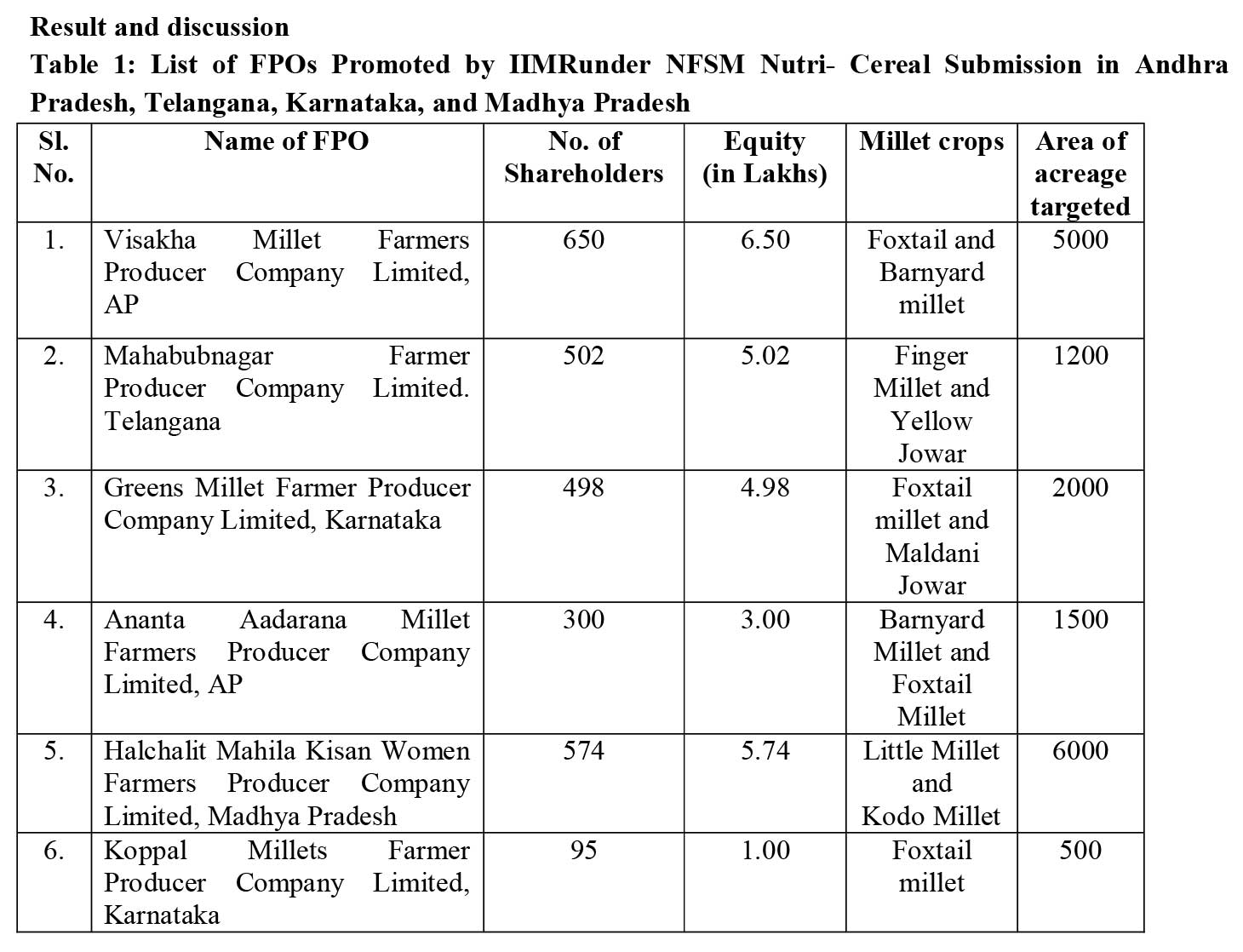
Table 1 represents the list of FPOs formed and promoted by IIMR under NFSM Nutri- Cereals. IIMR was Resource Organization for six FPOs spread across four states, two each FPOs in Andhra Pradesh and Karnataka, one each in Telangana and Madhya Pradesh. It can also be seen from the table that, among six FPOs five FPOs except for Koppal Millets Farmer Producer Company Limited, Karnataka has reached the targeted shareholders since its inceptioni.e., more than 300 farmers. They have also collected the share amount from the shareholders to submit for equity and also undertake business activities. All these six FPOs are involved in the cultivation, processing, and value addition of millets like Finger Millet, Kodo Millet, Yellow Jowar, Foxtail Millet, Little Millet Pearl Millet, etc.
In due course of time, the FPOs have also set a target to cover the area of acreage undertakes their operations viz., Halchalit Mahila Kisan Women Farmers Producer Company Limited, Madhya Pradesh in 6000 acres followed by, Visakha Millet Farmers Producer Company Limited, AP in 5000 acres, Greens Millet Farmer Producer Company Limited, Karnataka in 2000 acres, Ananta Aadarana Millet Farmers Producer Company Limited, AP in 1500 acres, Mahabubnagar Farmer Producer Company Limited. Telangana in 1200 acres and Koppal Millets Farmer Producer Company Limited, Karnataka in 500 acres.
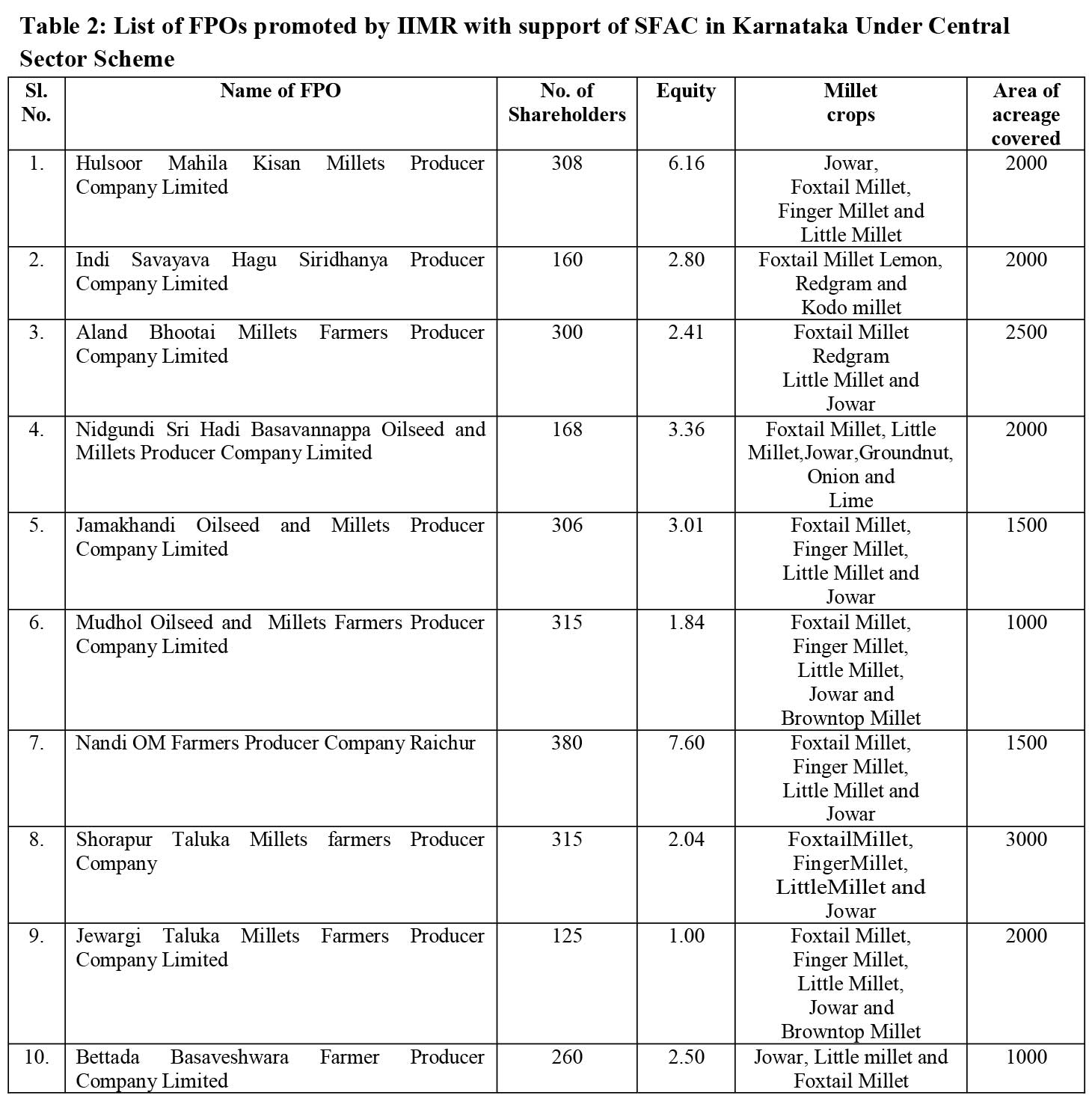
It is evident from Table 2 that, in total 10 FPOs were implemented by SFAC and promoted by IIMR as Cluster-Based Business Organization (CBBO) under the Central Sector Scheme. All the 10 FPOs were implemented at various districts of Karnataka. Six FPOs have mobilized more than 300 farmers to be its shareholders viz., Hulsoor Mahila Kisan Millets Producer Company Limited (302), Aland Bhootai Millets Farmers Producer Company Limited (300), Jamakhandi Oilseed and Millets Producer Company Limited (306), Mudhol Oilseed and Millets Farmers Producer Company Limited (315), Nandi OM Farmers Producer Company Raichur (382) and Shorapur Taluka Millets farmers Producer Company (315). Further, those six FPOs have also applied to equity to their Implementing Agency. The rest of the four FPOs namely, Indi Savayava Hagu Siridhanya Producer Company Limited (160), Nidgundi Sri Hadi Basavannappa Oilseed and Millets Producer Company Limited (168), Jewargi Taluka Millets Farmers Producer Company Limited (125), and Bettada Basaveshwara Farmer Producer Company Limited (260) are in the process of mobilizing the farmers.
The table also gives information on the major crops dealt by FPOs and the majority of the FPOs are working on Foxtail Millet, Finger Millet, Little Millet, and Jowar and also pulses redgram and chickpea. Nidagundi, Jamkhandi, and Shorapura FPOs also growing Groundnut, Hulasoor, and Jamkhandi FPOs deal with Soyabean apart from millets. Nandi Om and Bettadabasaveshwara FPOs farmers grow cotton and chili. The variation in the crops grown apart from millets is due to the local crops cultivated as per their agro-climatic conditions.
It can also be understood from the table that, the targeted area of acreage, Shorapur Taluka Millets farmers Producer Company has targeted to cover 3000 acres followed by, Aland Bhootai Millets Farmers Producer Company Limited to cover 2500 acres, Hulsoor Mahila Kisan Millets Producer Company Limited, Indi Savayava Hagu Siridhanya Producer Company Limited, Nidgundi Sri Hadi Basavannappa Oilseed and Millets Producer Company Limited and Jewargi Taluka Millets Farmers Producer Company Limited have targeted the area of 2000 acres, Jamakhandi Oilseed and Millets Producer Company Limited and Nandi OM Farmers Producer Company Raichur have targeted 1500 acres of area and Mudhol Oilseed and Millets Farmers Producer Company Limited as well as Bettada Basaveshwara Farmer Producer Company Limited have targeted about 1000 acres of land to undertake cultivation of millets and other mandated crops of their respective FPOs.
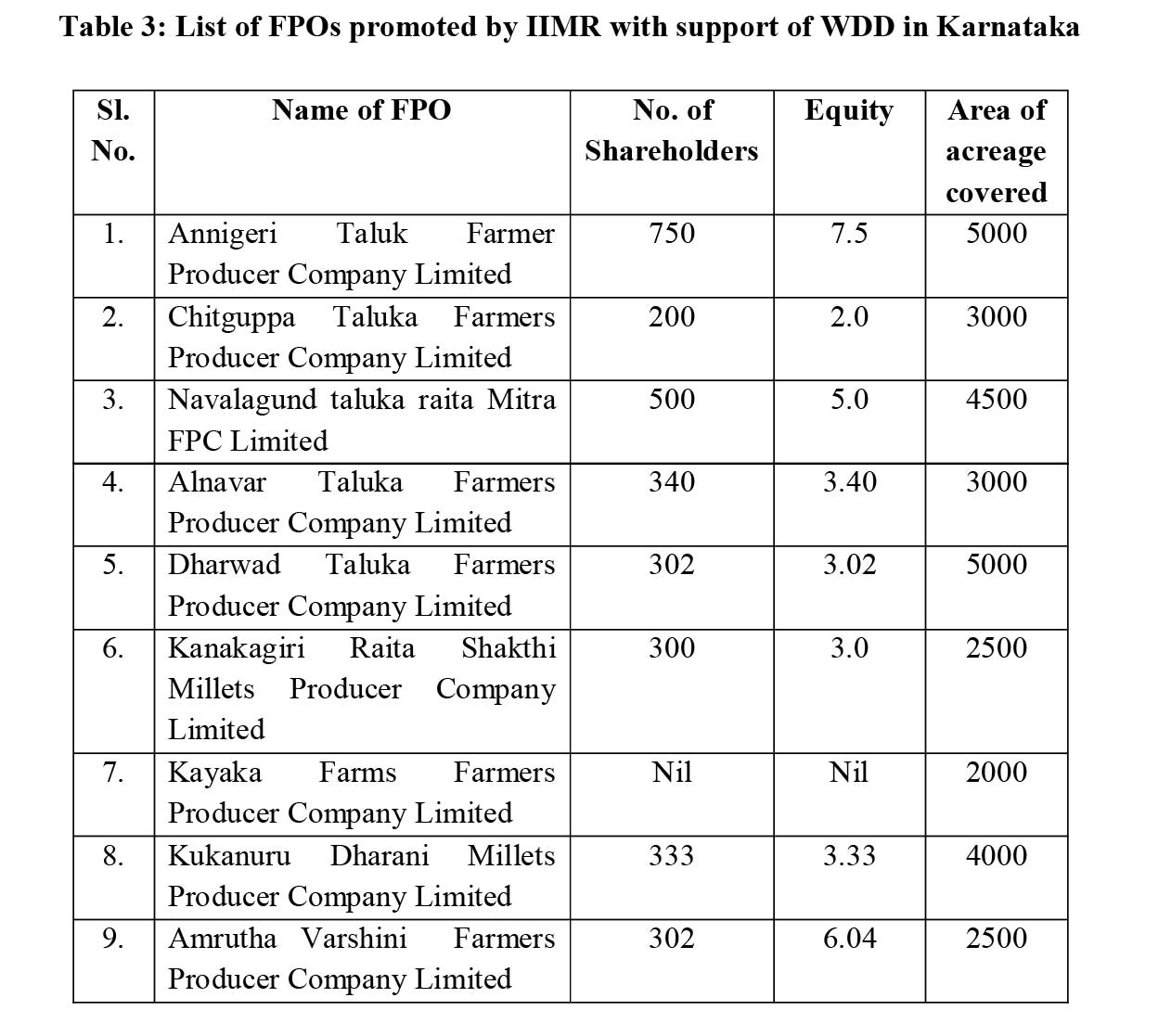
Table 3 indicates the list of FPOs promoted by IIMR with the support of the Watershed Development Department (WDD), in total 9 FPOs were implemented in Karnataka state. Out of nine FPOs six have mobilized more than 300 FPOs namely, Annigeri Taluk Farmer Producer Company Limited (750), Navalagund taluka raita Mitra FPC Limited (500), Alnavar Taluka Farmers Producer Company Limited (340), Dharwad Taluka Farmers Producer Company Limited (302), Kanakagiri Raita Shakthi Millets Producer Company Limited (300), Kukanuru Dharani Millets Producer Company Limited (333) andAmruthavarshini Farmers Producer Company Limited (302), among these FPOs, Annigeri Taluk Farmer Producer Company Limited, Navalagund taluka raita Mitra FPC Limited, Alnavar Taluka Farmers Producer Company Limited and Amruthavarshini Farmers Producer Company Limited have submitted the equity application to the funding agency.
The rest of the two FPOs viz., Chitguppa Taluka Farmers Producer Company Limited and Kayaka Farms Farmers Producer Company Limited and are in the process of mobilizing the farmers to be shareholders of their respective FPOs.
The table also furnishes information on the major crops dealt by FPOs, wherein, Annigeri Taluk Farmer Producer Company Limited is concentrating on crops like Green gram, Maize, Bengal gram, and Chilli. Chitguppa Taluka Farmers Producer Company Limited deals with Soyabean, Redgram, Greengram,and Black gram. Major crops of Navalagund taluka raita Mitra FPC Limited are Bengal gram and Chilli. Alnavar Taluka Farmers Producer Company Limited majorly deal with Paddy, Maize, and Mango. Soybean and Bengal gram are the major crops on which Dharwad Taluka Farmers Producer Company Limited. Kanakagiri Raita Shakthi Millets Producer Company Limited and Kukanuru Dharani Millets Producer Company Limited are dealing with millets. Kayaka Farms Farmers Producer Company Limited hasundertakenplantation of Pomegranate and Amruthavarshini Farmers Producer Company Limited deals with Drumstick.
Apart from NFSM Nutri- Cereals, SFAC and WDD FPOs, ICAR-IIMR is also involved in the promotion of FPOs of NABARD and NCDC in Andhra Pradesh and Telangana states. So far, four FPOs are being promoted under NABARD in Andhra Pradesh and Telangana, two FPOs under NCDC in Telangana. These FPOs are in the process of mobilizing the farmers to be the shareholders of the FPOs.
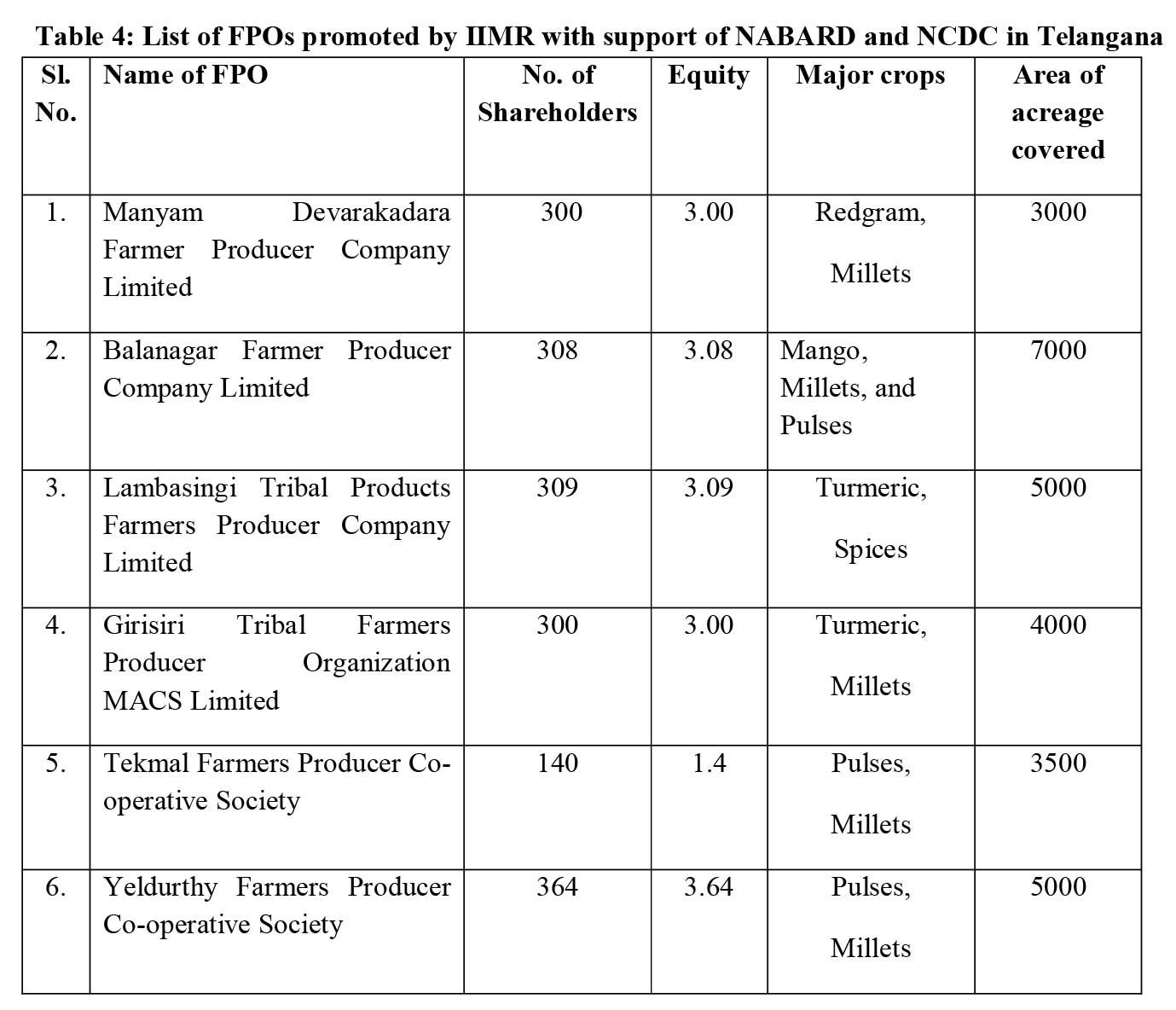
Table 4 depicts the list of FPOs promoted by IIMR with NABARD and NCDC as implementing agencies in the Telangana region. In total IIMR has been involved in the promotion of 31 FPOs spread across four states of India, to popularize millets and to create awareness on the importance of millets thereby inculcating the habit of consumption of millets for good health. Further, to connect smallholders to the market.

Table 5 indicates the list of FPOs promoted by IIMR and which are implemented at variousstatesdepicts that, 21 FPOs are being incorporated in the state of Karnataka, followed by five FPOs in Telangana, four and one FPOs in Andhra Pradesh and Madhya Pradesh respectively.
According to studies, there exists a difference between traditional marketing of the produce grown by the farmers and how the intervention of FPO brings changes in the marketing of their produce, by eliminating the marketing middlemen to ensure the economies of scale to the farmers. This concept is depicted in Fig 2.
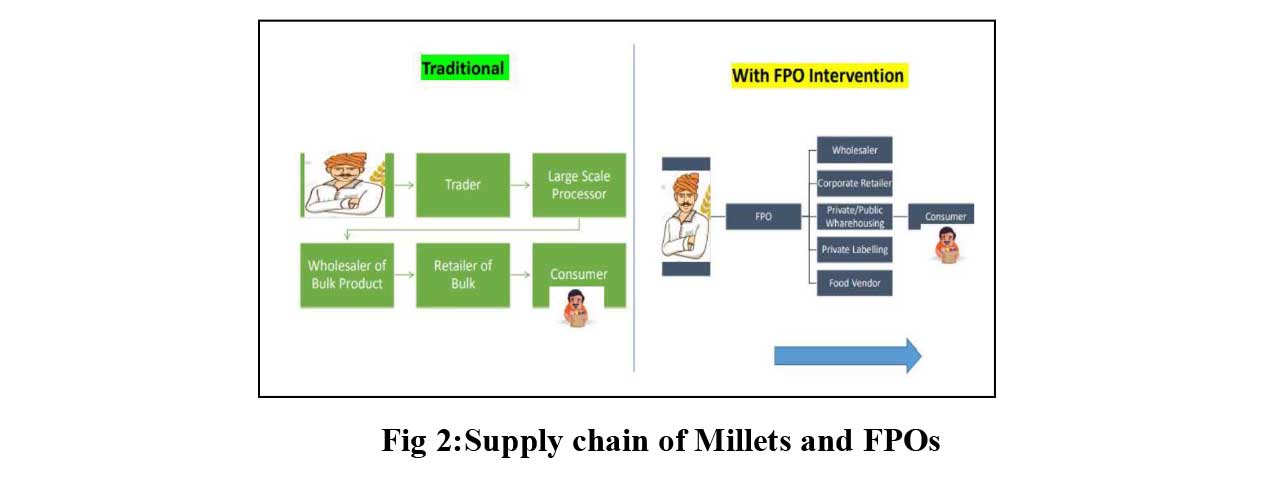
The schematic representation of the Supply chain of Millets and FPOs is shown in Fig 2. This indicates the interlinkage of millet growers and the FPOs for undertaking activities like providing inputs, training, capacity building programs, procurement, aggregation, undertaking processing, and value addition, and further, sale of value-added products from FPOs directly to retailers.
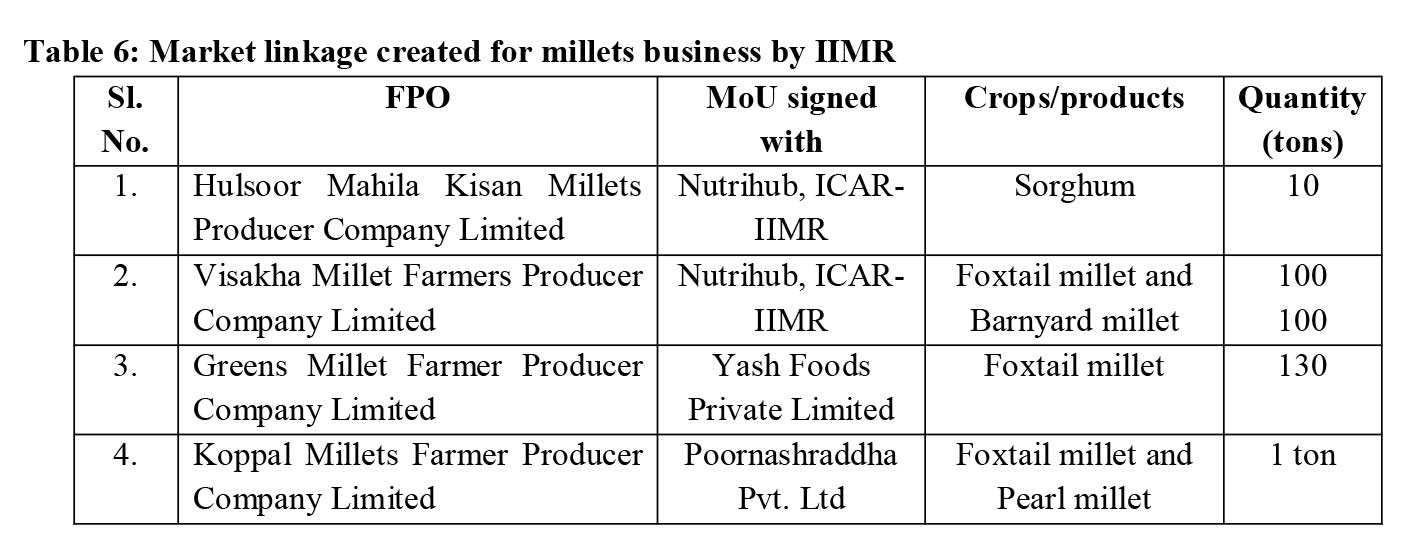
Market linkages created for millets business by ICAR-IIMR for various FPOs is represented in Table 6, wherein, it can be seen that Hulsoor Mahila Kisan Millets Producer Company Limited and Visakha Millet Farmers Producer Company Limited have signed MoU with ICAR-IIMR, Hyderabad for sale of Sorghum and Foxtail millet, Barnyard millet respectively. Apart from procurement made by IIMR, it has also successfully made market linkage for Greens Millet Farmer Producer Company Limited for sale of Foxtail millet and Koppal Millets Farmer Producer Company Limited for sale of Foxtail millet Pearl millet with Yash Foods Private Limited and Poornashraddha Pvt. Ltd respectively. This effort is to support the farmers to cultivate and to assure them with the market to sell their millets produce. IIMR is also in the process to link other FPOs also with markets for ensuring better income to the shareholders of FPOs.

Business activities of FPOs of different Implementing Agencies are presented in Table 7and it reveals that SFAC FPOs which are operating in different districts of Karnataka are undertaking business activates on Pulse magic, Chickpea magic, and seeds, similarly, WDD FPOs of Karnataka state are operating business on Oil, Jaggery, and Rawa in addition to Millets processing & Value addition. NABARD FPOs in Andhra Pradesh and Telangana are undertaking business on Fertilizers, NCDC FPOs in Telangana states are operating their business with Millets and vegetables. The FPOs implemented under NFSM Nutri- Cerealshave undertaken value addition of millets and sell the products like Millet noodles, Papad, Rawa, andMillet Dosa mix Flour.
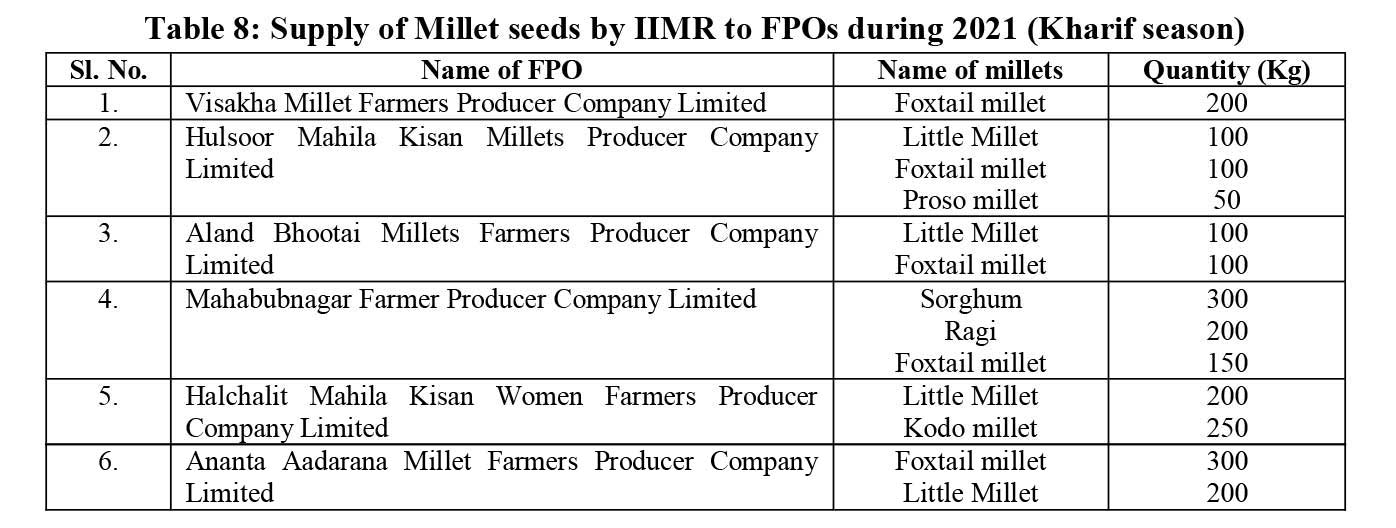
Table 8 indicates the list of FPOs to whom ICAR-IIMR has supplied seeds of millets to promote the adoption of good quality seeds in the production of millers. IIMR has supplied 200 Kg of Foxtail millet seeds to Visakha Millet Farmers Producer Company Limited. Little Millet (100 Kg), Foxtail millet (100 Kg), and Proso millet (50 Kg) seedswere supplied to Hulsoor Mahila Kisan Millets Producer Company Limited. 100 Kg each of Little Millet and Foxtail millet were supplied to Aland Bhootai Millets Farmers Producer Company Limited. Sorghum (300 Kg), Ragi (200 Kg), and Foxtail millet (150 Kg) were supplied to Mahabubnagar Farmer Producer Company Limited. Little Millet (200 Kg) and Kodo millet (250 Kg) seeds were supplied to Halchalit Mahila Kisan Women Farmers Producer Company Limited. 300 Kg of Foxtail millet and 200 Kg of Little Millet were supplied to Ananta Aadarana Millet Farmers Producer Company Limited. ICAR-IIMR is working in the direction to promote the production, processing, and value addition of millets to infuse the habit of consumption of millets among the folk to maintain good health.
Linking Millet Startups with FPOs
ICAR-Indian Institute of Millets Research (IIMR), is the nodal agency to work on all aspects of millets research and development in the country. Nutrihub is a focal point where ideas, entrepreneurs, agriprenuers, start-ups, experts, the academic, and the funding agencies shall gravitate to the wards creation of a new knowledge-based economy. ICAR-IIMR under Nutrihub has incubated 15 startups and those have started their business on millet-based value addition and are marketing their produce in their own brand. In this connection, the effort was made to link Millet FPOs to these startups to sell the millets produced by FPOs of IIMR. This is a win-win situation for both FPOs as well as to the startups where the former could find the right market and the latter could get the quality products for further processing and value addition.
Conclusion
FPO can be formed for leveraging economies of scale in production and marketing. Facilitating market information about the produce for judicious decisions in production and marketing and logistics services such as storage, transportation, loading/unloading, etc. on a shared cost basis. Thus, the IIMR as a CBBOis involved in integrating FPOs with both forward and backward linkages in agriculture. The main objective is to bring economies of scale to the farmers by improving their income of the farmers. The IIMR is a CBBO for 25 FPOs and resource organization for six FPOs has come up with market linkages to help farmers to sell their produce, in this connection, IIMR has successfully linked three FPOs to market future strategies anticipating that these FPOs will bring about significant changes in the lives of small and marginal farmers. However, the majority of these FPOs are in the formation stage and hence require proper guidance and suggestions regarding improving the value of their productsutilizing processing and value addition. Ultimately the FPOs market the aggregated produce with better negotiation strength to the buyers and in the marketing channels offering better and remunerative prices.
References
- Sharma, P. (2013). Leveraging Farmer Producer Organizations to Boost Production, Mitigate Risk and Strengthen Food Security: Lessons and challenges. Journal of Land and Rural Studies, 1(1), 41-48. https://doi.org/10.1177/2321024913487270
- K B Ramappa and M A Yashashwini, 2018. Evolution of Farmer Producer Organizations: Challenges and Opportunities. Research Journal of Agricultural Sciences 9(4): pp-709-715.
- K V Raju and D Kumara Charyulu, 2017. Linking Farmers with Market through FPOs: Challenges and Opportunities. Doubling Farmers’ Income: KISAN–MITrAAt: 15–16 March 2017, Vivekananda International Foundation (VIF), No: 3, San Martin Marg, Chanakyapuri, New Delhi – 110021.
